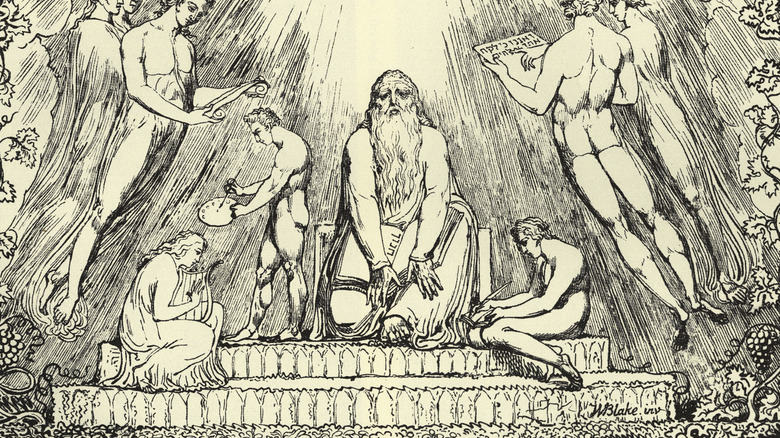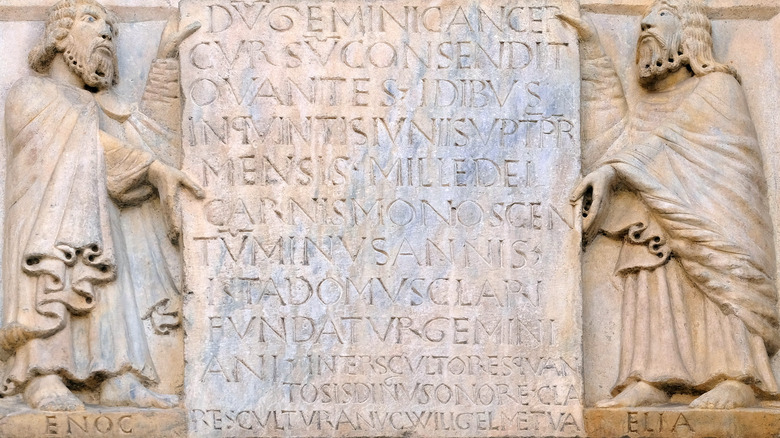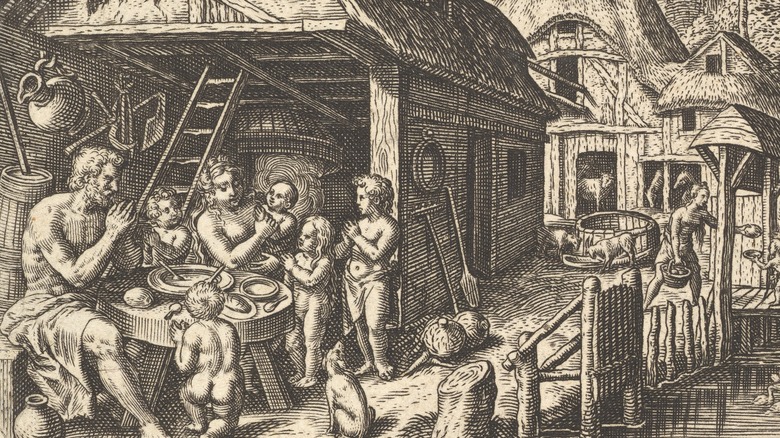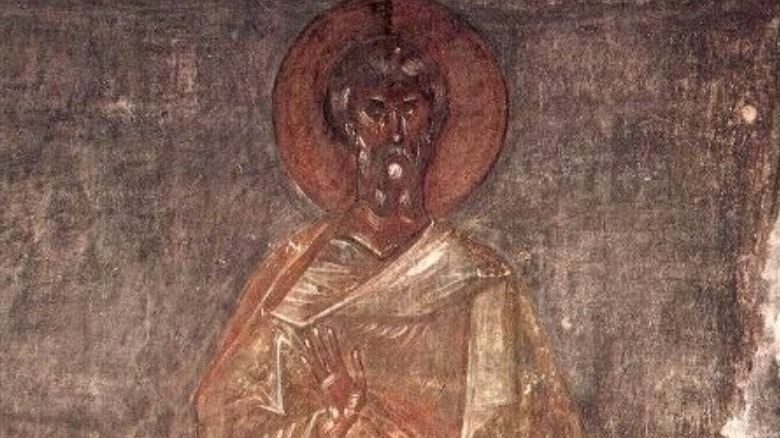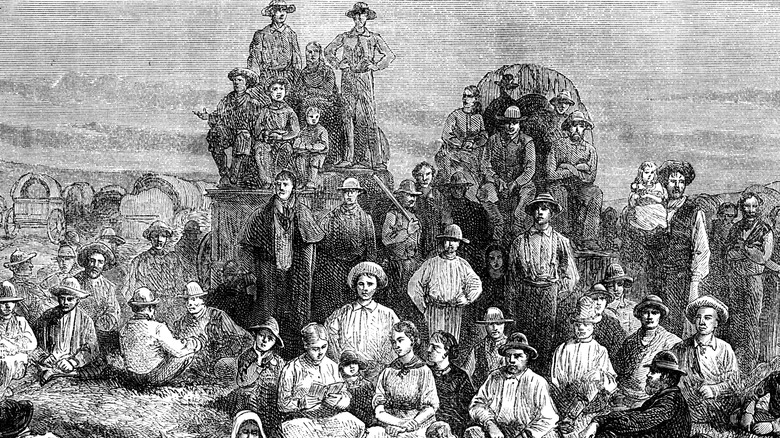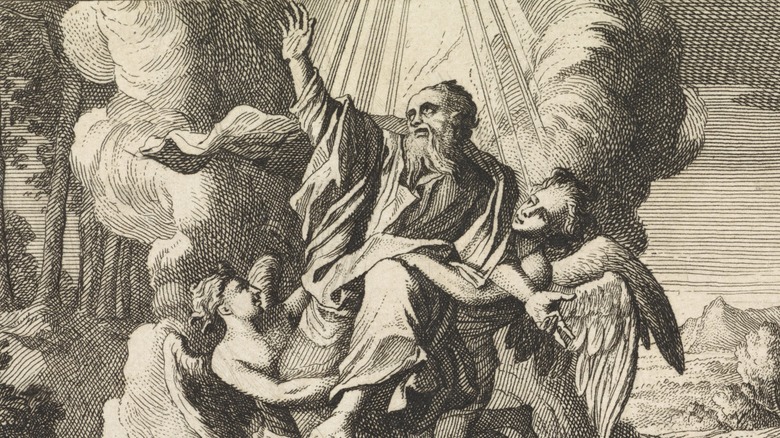The Untold Truth Of Enoch
According to Genesis 5:21-24 in the Bible, Enoch was the ancestor of the biblical Noah and the father of Methuselah, the longest-living figure noted in biblical history. He is considered the author of the Book of Enoch, a text not included in most versions of the Bible, which has spawned apocryphal versions and even modern comedy films. However, none of these are Enoch's greatest claim to fame.
We do know that Enoch is said to have lived 365 years (many figures in Genesis are referred to as having lived centuries, which is a subject of its own debate), but it's his exit from mortality that has inspired boundless theories and even entire specializations in Old Testament theology. Every other figure noted in the genealogical passage is said to have died, but Enoch's excerpt does not end with a note on his death. Instead, in Genesis 5:21-24, his life ended like this: "Enoch walked with God: and he was no more, for God took him."
For centuries, students of Scripture, both secular and religious, have speculated as to what this could possibly mean. And it's inspired a cornucopia of unusual theories and even religious sects.
Background
Enoch is a significant figure in Judaism, Christianity, Islam, the Church of Jesus Christ of Latter-day Saints, and other Abrahamic religions. Most (if not all) agree that Enoch was the ancestor of Noah and one of the earliest ancient prophets in early biblical times. The Book of Enoch, a noncanonical Jewish text traditionally ascribed to Enoch himself, factors in to legends of his life and influence to varying degrees, as do his other noncanonical texts, 2 Enoch and 3 Enoch.
The phrasing of Genesis 5:24, which reads, "and he was not, for God took him," or, alternatively, "and he was not, for God translated him," is generally understood to mean Enoch escaped death (via Encyclopedia.com). Enoch is the subject of a rich historical index of apocryphal literature, and is believed by some faiths to have been in possession of rare esoteric knowledge and privileges (via Britannica). His unique exit from the earthly sphere, as well as the usage of the phrase "walked with God," have solidified Enoch's role as a remarkable figure in religious tradition for millennia.
Enoch in Judaism
According to New World Encyclopedia, the Judaic view of Enoch as a devout man taken to heaven and blessed with the title "Safra Rabba" (or "Great Scribe") originates from the Targum Pseudo-Jonathan, an interpretation of the Torah said to have originated in the land of Israel (via Oxford Bibliographies). In the Sefer Hekalot, more about Enoch is revealed, and he once again appears in an encounter. In the text, the Rabbi Ishmael encounters Enoch in the Seventh Heaven, where Enoch tells him his story: The earth had become corrupt with immorality thanks to the demons Shammazai and Azazel prior to Enoch's ascendance to heaven.
Other legends state that in his time, Enoch gathered his own disciples and was proclaimed a king, at which point he was summoned to rule over the sons of God in heaven. Under Enoch's reign, there was said to have been peace on Earth.
Enoch in Islam
In Muslim tradition, Enoch (or "Akhnūkh") is sometimes understood to be the ancient prophet Idris. Other than Adam, Idris is the only ancient prophet mentioned in the Quran: in The Prophets 21:85 and Mary 19:56-57 (via My Islam and Britannica). Mary 19:56-57 could be reiterating a similar statement to that of Genesis 5:24: "And remember Idris in the Book; he was indeed very truthful, a Prophet. And We lifted him to a high station" (per Quran Legacy).
Idris (or Enoch) is the subject of extensive traditional folklore. He is frequently mentioned in later Muslim traditional texts or legends. In the Sunni text Sahih Muslim, one of the six hadith texts said to contain the experiences of Muhammad as conveyed through his messengers, Muhammad is said to have encountered Idris (or Enoch) in the fourth heaven on his Night Journey (via My Islam).
The view that Enoch and Idris were the same figure was popularized by the author Taberi. While some modern Muslim scholars contest the belief that Idris and Enoch were the same man, Enoch is nonetheless regarded as one of Islam's earliest and most exalted prophets.
Enoch in the Church of Jesus Christ of Latter-day Saints
In the Church of Jesus Christ of Latter-day Saints, Enoch looms large in legend. When the church's founder, Joseph Smith, had his first visions, he claimed to have received a wealth of information on Enoch's life and legacy (via MormonWiki). According to the Book of Moses (via Church of Jesus Christ of Latter-day Saints, Moses 7:1-20), Enoch was said to have been called to preach against wickedness, but found himself rejected by the masses. Enoch was then said to have continued his ministry, met the Lord face-to-face, communicated with the not-yet-incarnate Jesus Christ, and eventually gathered many converts (via Encyclopedia of Mormonism).
Enoch was then said to have ruled over those converts in a spiritual utopia of sorts which experienced total economic equality, living in a state of such righteousness it transcended ordinary physical dimensions. This city of Zion was said to have existed 365 years before it was taken up into heaven along with Enoch (via Encyclopedia of Mormonism). The Latter-day Saints strive to recreate the "Zion" of Enoch, and believe such a society will come again.
Enoch in Christianity
Enoch is mentioned three times in the Christian New Testament: in the New Testament Gospel of Luke (Luke 3:37), the Epistle of Jude (Jude 1:14-15), and again in the Epistle to the Hebrews (Hebrews 11:5-6). The text from the Epistle of Jude is commonly considered a reference to or paraphrase of an excerpt from the Book of Enoch (as E.T. Anderson notes in "The Canonization of the Epistle of Jude in Relation to the Rejection of the Book of Enoch," posted at Liberty University).
Early Christian tradition lent heavy credence to the Book of Enoch, and key Christian figures cited this text as the basis for beliefs about the Nephilim, or the offspring of otherworldly beings that lived on earth in antediluvian times and bred with "daughters of men" (via New World Encyclopedia). However, like in other religions, Enoch is generally accepted to be a pious figure who was exempted from death due to his righteousness, although the variations on this belief and its significance are as diverse as history could possibly render them.
